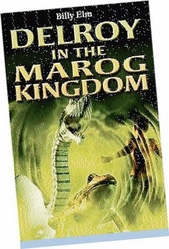
Photo by Melville Cooke
Title: Delroy in the Marog Kingdom
Publisher: MacMillan Caribbean
Author: Billy Elm
Mel Cooke, Gleaner Writer
Billy Elm's Delroy in the Marog Kingdom is firmly rooted in the Caribbean - which is the intention of MacMillan Caribbean's Island Fiction series that it is part of in the first place. So this 180-page piece of speculative fiction, where the boundaries of the possible and plausible are tested, is set in a rural village that could be in any rain-drenched, sun-kissed Caribbean island.
But the language which the main character, Delroy, uses when the frog which he puts on the stove at his home says to him "I'm going to get you for this, you bully" is distinctly Jamaican.
"Rahtid, Mario! One duppy frog!" Delroy says to his brother Mario.
The start of Delroy's journey
It is the start of Delroy's journey, not only into the Marog kingdom (they look very much, but are not quite, frogs) but also manhood, although this stage of development is not mentioned. And while Delroy in the Marog Kingdom turns around that staple of fiction targeting boys, the great adventure where they face down great dangers, it is also a story of family - distinctly Caribbean style.
For in another culture, Delroy and Mario would be referred to as 'half-brothers', seeing that they do not have the same mother. They would probably not be spending so much time together and Delroy's mother would not be making dresses for Mario's mother (Aunt Dahlia, to Delroy), the latent animosity between the two surfacing over the seamstress duties.
All this comes before the great adventure (where Delroy is sucked down into the Marog Kingdom while swimming in the village lake, is transformed into a marog himself, eyed as successor to the throne by King Nimrod and sent along with Gorem to fetch the life-saving stone guarded by the great snake), family matters closing off the book as well.
So, while the adventure takes up most of Delroy in the Marog Kingdom, Elm's main point is, I believe, family, Delroy reconciling his ambivalence and even anger towards his father and hopping (in marog form) by his mother's home while on his adventures.
There are worthwhile lessons in the family focus. However, the fantastic journey, which has the customary elements of boy fantasy, is not to be discounted. There is the mandate to save the world (or at least an important part of it) as the marogs' very existence hinges on recovering the stone the snake guards. There is the dangerous journey, as along with another boy-turned-marog, Gorem Delroy (named Roydel by King Nimrod) must travel the length of the marogs' underground world on their quest, the vicious merats littering the way. Add to that the sneaking, vicious, cowardly Javan, who believes he is the heir to the throne and proves a very dangerous, persistent foe.
'The womarogs'
And, naturally, there are the girls, as Roydel and Gorem discover that the womarogs, who were thought to have all died, are very much alive and extremely happy to see two young marogs. In fact there is another fantasy female, the River Mumma, who holds a deadly attraction for the boy Delroy and the marog Roydel.
One accustomed element of fiction, speculative or not, directed towards boys which Elm rejects is the appeal to strength and size. Instead of being transformed into something bigger like Hulk, stronger and faster like Superman and Flash or superbly intelligent like Dr Xavier, Delroy/Roydel gets smaller and physically vulnerable (a dog is a giant), with only the wits he had previously to rely on. He does have one weapon - poison glands on the top of his head, which he uses to very good result in the final confrontation with the snake.
Oh, as a marog he also eats things that crawl and squirm.
Elm's creation of a character who has to rely on his own strengths, courage and wits is notable and commendable.
However, Delroy in the Marog Kingdom could have done with some more zip and zing in the language. It is, however, Elm's first novel - and in a new series at that, and unlike Delroy's transformation getting the writing 'oomph' does not come the first journey.
In the end, Roydel is transformed back into Delroy and all is well. He will, of course, never bully frogs again.